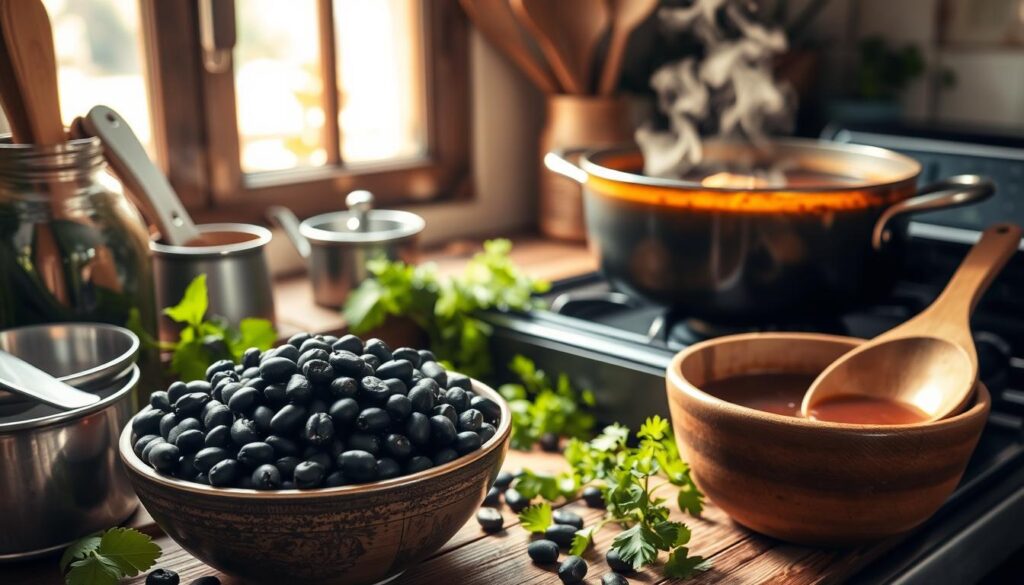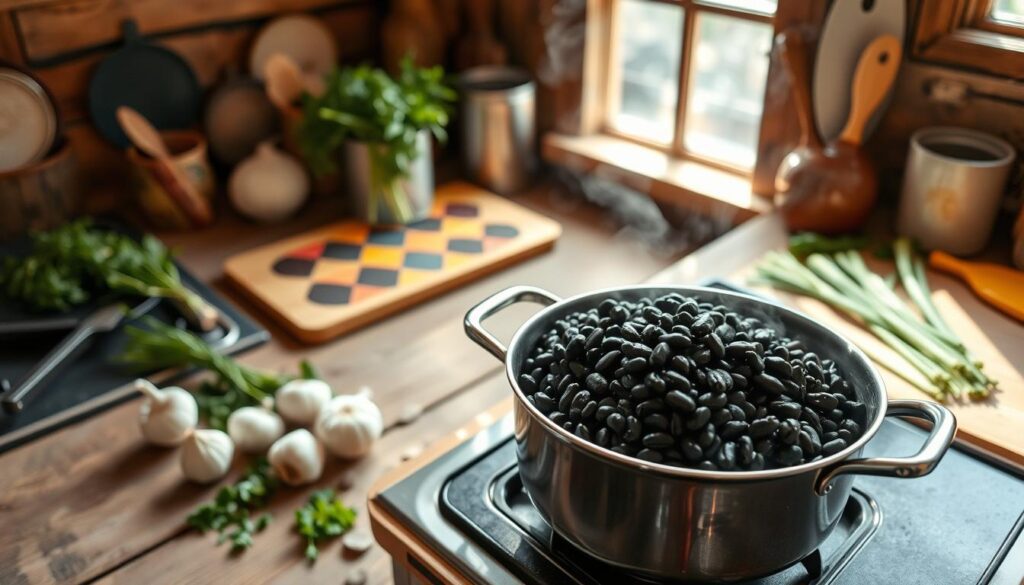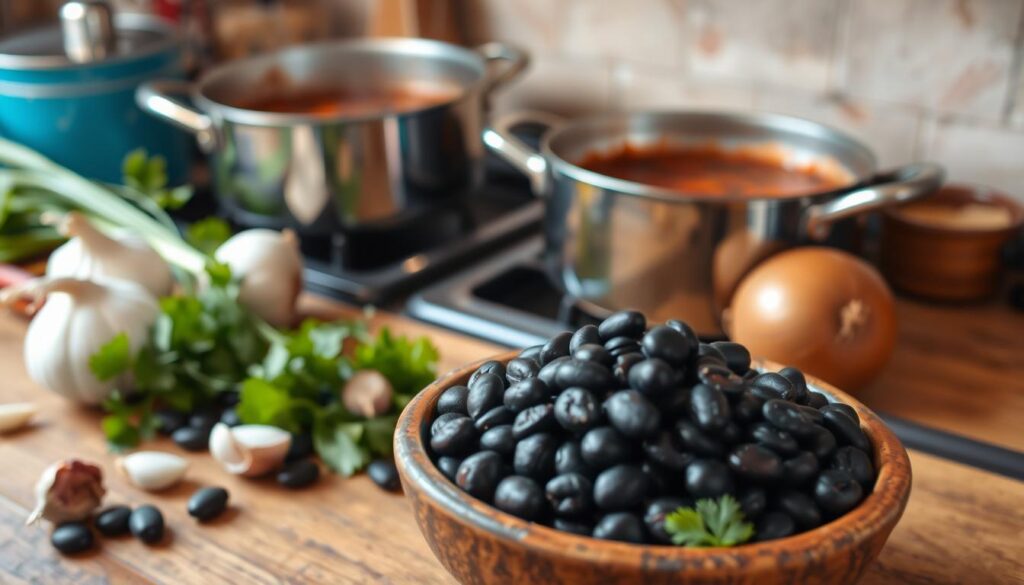Many people wonder if they need to soak black beans before making soup. Soaking beans was once believed to make them cook faster, taste better, and be easier to digest. But, research shows soaking might not be essential for a tasty black bean soup.
In this article, we’ll look at why people soak beans, share cooking experiences, and examine scientific findings. It seems whether to soak black beans for soup comes down to personal taste more than cooking rules.

Key Takeaways
- Soaking black beans can reduce cooking time but may not enhance flavor.
- Un-soaked beans retain a stronger aroma and richer taste.
- Soaked beans often result in less flavorful soup and thinner gravy.
- Overall, un-soaked beans are preferable for quality and cooking efficiency.
- Freshness of beans influences cooking time and texture.
Introduction to Cooking Black Beans
Cooking black beans adds a rich and nutritious touch to many dishes. Using dried black beans saves money and boosts flavor compared to canned beans. Each half-cup of cooked black beans packs 8 grams of protein, great for increasing your nutrient intake.
Bean soup is a favorite way to use black beans, showing their versatility. Cooking time varies from 45 minutes to three hours, depending on the beans’ age and cooking method. An Instant Pot can cut this time to 35 minutes, making beans tender without soaking.
A one-pound bag of dried black beans yields about six cups of cooked beans, like three cans. This makes them both affordable and a handy pantry item. Adding spices and aromatics can enhance the flavor of your dishes.

Beans last longer than canned ones. Dried beans can stay good for up to two years. Cooked beans can be kept in the fridge for two weeks or frozen for six months. This ensures they’re always ready for your recipes.
Learning to cook black beans can turn simple meals into hearty, satisfying dishes. It also lets you enjoy the nutritional benefits these legumes offer.
The Benefits of Cooking Black Beans from Scratch
Cooking black beans from scratch has many benefits. It improves both flavor and quality. Making homemade black beans lets you control what goes into them. This means no preservatives or additives found in canned beans.

A one-pound bag of dried black beans costs about $1.19. This gives you six cups of cooked beans. That’s enough to replace three and a half cans, saving you money. Plus, it reduces packaging waste, helping the environment.
Flavor is another big plus. Homemade black beans have a rich, savory broth. This is often missing in canned beans. Soaking beans in salt water before cooking makes them creamier. This is great for older beans, ensuring they cook evenly and taste better.
Also, you can add your favorite seasonings and ingredients. This lets you customize each batch. You can’t do this with mass-produced beans.
In short, choosing to make homemade black beans is a smart choice. It’s good for your health and makes meals more enjoyable. Cooking beans from scratch is a step towards a more sustainable and flavorful diet.
What Happens When You Soak Black Beans?
Soaking black beans is a common practice, but it’s good to know what it does. Soaking can cause some loss of pigments and nutrients. This might make the beans taste less vibrant in dishes like soup.
Some chefs say unsoaked beans soak up flavors better. This makes the taste of dishes more intense and enjoyable.
Understanding Flavor Retention
Soaking black beans might not be as beneficial as thought. It can make the beans lose some of their natural flavors. This can change the taste of dishes, making them less rich.
Beans that aren’t soaked keep their natural taste better. This makes them perfect for soups, where flavor is key.
Impact on Cooking Time
Soaking can save about 30 minutes in cooking time. This is good for those who are short on time. But, soaked beans might not cook evenly.
Unsoaked beans cook well without much delay. They become tender in 1½ to 2 hours when simmered. Fresh black beans can cook in about an hour. The cooking time can vary based on the beans’ age and water quality.
Do You Have To Soak Black Beans Before Making Soup?
Many chefs share their views on soaking black beans before cooking. They talk about how soaking changes the taste and texture. They also say it’s good to try different soaking methods, based on what you like.
Expert Opinions on Soaking
There are many views on soaking beans. Some chefs say you don’t need to soak them. They think unsoaked beans taste better and feel softer. They also talk about mixing soaking with traditional cooking methods.
Experts also mention digestive health. They say not soaking beans might make them easier to digest. This makes cooks think about their own experiences with soaking beans.
Whether to soak black beans is up to you. Knowing the different opinions and methods helps you decide. Trying out different ways of cooking black beans can make your cooking better.
Results from Cooking Soaked vs. Unsoaked Beans
Knowing the difference between soaked and unsoaked beans can change your black bean soup. Recent taste tests showed how bean texture and flavor vary with cooking methods.
Texture and Consistency Comparison
Unsoaked beans are firmer and better for soups. They keep their shape when cooked. Soaked beans, on the other hand, get softer and can make the broth thinner.
Flavor Profile Analysis
The flavor profile of black beans changes with soaking. Unsoaked beans soak up more flavors, making the soup taste richer. Soaking can water down these flavors, making the soup less tasty. Taste tests often show unsoaked beans make a more flavorful soup.
| Parameter | Soaked Beans | Unsoaked Beans |
|---|---|---|
| Texture | Softer, can become mushy | Firm, holds shape well |
| Broth Consistency | Thinner | Thicker |
| Flavor Absorption | Less effective | More robust |
| Cooking Time | About 1 hour 15 minutes | About 2 hours |
Cooking Methods for Black Beans
There are many ways to cook black beans. Each method has its own benefits and flavors. You can choose from slow cooker, stovetop, or oven baking.
Slow Cooker Method
Cooking black beans in a crockpot is easy. It lets you do other things while the beans cook. Here’s how to do it:
- Use 1 pound (about 2 cups) of dried black beans.
- Soak the beans overnight for better texture.
- Add 10 cups of water to the slow cooker.
- Set the crockpot on low for 6 to 8 hours if soaked; unsoaked beans take 8 to 10 hours.
- Season the beans near the end for more flavor.
Stovetop Method
The stovetop method lets you control the cooking. It’s a hands-on way to cook black beans. Here’s how:
- Soak 1 pound of dried black beans overnight.
- Rinse the beans and put them in a Dutch oven with 10 cups of water.
- Bring to a boil, then lower the heat to a simmer.
- Cook for 1 ½ to 2 hours, adjusting the water as needed.
- Check if the beans are tender; older beans might need more time.
Oven Method
Oven baking is another good way to cook black beans. It’s great for cold weather. Here’s how to do it:
- Preheat the oven to 325°F (163°C).
- Soak the beans overnight and rinse them.
- Put the beans and 10 cups of water in a Dutch oven with a tight lid.
- Bake for 2 to 3 hours, keeping the lid on to keep moisture in.
- Season to taste when done.
Each method makes delicious black beans for different recipes. Think about your time, taste, and convenience when choosing a method.
| Cooking Method | Soaking Required | Time Frame | Water Ratio |
|---|---|---|---|
| Slow Cooker | Yes | 6 to 8 hours | 10 cups per pound |
| Stovetop | Yes | 1½ to 2 hours | 10 cups per pound |
| Oven | Yes | 2 to 3 hours | 10 cups per pound |
How to Enhance the Flavor of Black Bean Soup
To make a rich black bean soup, choose your ingredients wisely. Start with onions, garlic, and carrots. These aromatics are key to a great flavor. Add them early to get the most taste.
Using Aromatics Effectively
Aromatics can really change your soup. Cook chopped onions, carrots, and garlic in oil until they’re soft and smell good. This step helps the flavors mix well, making your soup taste amazing.
Here are the must-haves for your soup:
- 1 onion, chopped
- 2 cups of chopped carrots
- 3 tablespoons of minced garlic
Incorporating Additional Seasonings
Spices can make your black bean soup even better. Try adding cumin, smoked paprika, and dried oregano for depth. A bit of red wine vinegar adds a tangy touch that cuts through the richness.
Here’s a guide for seasoning:
| Spice | Quantity | Flavor Profile |
|---|---|---|
| Cumin | 1 tsp | Earthy, warm |
| Smoked Paprika | 1 tsp | Smoky, sweet |
| Oregano | 1½ tsp | Herbaceous, slightly bitter |
| Adobo sauce | 2 tbsp | Spicy, smoky |
| Red Wine Vinegar | ¼ cup | Tangy, sharp |
Try out these spices and adjust to your taste. This way, you’ll make a soup that’s full of flavor and fun to eat.
Health Considerations When Cooking Beans
Many people wonder about the digestibility of beans. They often debate whether soaked or unsoaked beans are better for health. Some think soaked beans are easier on the stomach, but research shows unsoaked beans can be just as gentle.
Digestibility of Soaked vs. Unsoaked Beans
It’s surprising how many forget to soak beans before cooking. Yet, many people don’t experience much discomfort from unsoaked beans. Professional chefs often soak beans for recipes, but unsoaked beans rarely cause problems.
Studies show that both soaking methods work well, as long as cooking is done right. This means both soaked and unsoaked beans can be easily digested.
Beans and Gas Production Myths
Myths about beans causing gas often stop people from enjoying them. Soaking beans is a common way to reduce gas, but there are other methods too. Using kombu, a seaweed, during cooking can help without soaking.
Kombu lowers phytic acid in unsoaked beans and adds flavor. Soaking beans can improve health by making nutrients easier to absorb.
When making bean recipes, soaking kidney-shaped beans and dried/split peas for 12-24 hours is best. This helps keep them fresh, even in warm weather. Following these tips can make your bean dishes healthier and more digestible.
Delicious Purple Black Bean Soup Recipe
Making a comforting and nutritious dish is easy with this purple black bean soup recipe. It highlights the special flavors of purple black beans. It’s perfect for a delicious meal with family and friends.
- 1 ½ cups dried purple black beans (or 3 cups canned)
- 4 cups vegetable or chicken broth
- 1 to 3 canned chipotles in adobo, finely chopped
- 1 tablespoon adobo sauce
- 1 diced onion
- 1 diced carrot
- 2 cloves garlic, minced
- 1 teaspoon ground cumin
- 1 teaspoon smoked paprika
- ½ teaspoon chili powder
- ½ teaspoon dried oregano
- Salt and pepper to taste
- Optional: canned diced tomatoes
For serving, consider these toppings to enhance flavor:
- Diced avocado
- Lime wedges
- Fresh cilantro leaves
- Sour cream or Greek yogurt
- Shredded cheddar cheese
- Crumbled bacon or chorizo
Follow these steps to prepare the soup:
- Soak the dried purple black beans in water for 6 to 8 hours or overnight. If using canned beans, drain and rinse them.
- In a large pot, heat a bit of oil over medium heat. Add the diced onion and carrot, cooking until softened.
- Stir in the garlic, cumin, smoked paprika, chili powder, and oregano, cooking for 1 minute until fragrant.
- Add the soaked beans (or canned beans), broth, chipotles, adobo sauce, and optional diced tomatoes. Bring to a boil.
- Reduce heat and let it simmer for about 1 hour, or until the beans are tender.
- Season with salt and pepper to taste. Use an immersion blender to gently purée the soup, leaving some chunks for texture.
- Serve hot with your choice of toppings for a delightful meal.
This purple black bean soup recipe serves 4. It’s packed with flavor and health benefits. It’s high in protein and fiber, supporting digestive health. Whether you cook black beans from scratch or use canned, this recipe is flexible and delicious.
Conclusion
Exploring how to cook black beans shows us that soaking isn’t always necessary. Soaking can make the beans softer and quicker to cook. But, it’s not the only way to make delicious black bean soup.
Whether you soak your beans or not, both methods can lead to tasty results. Each way adds something special to your dish. This makes your black bean soup not only delicious but also very nutritious.
Trying both soaked and unsoaked black beans is a great idea. It lets you find what you like best. This way, you can enjoy the real taste and texture of black beans in your cooking.
So, whether you soak or not, the most important thing is to enjoy cooking. Discovering the best way to cook black beans can make your meals even better. Happy cooking!
FAQ
Do you have to soak black beans before making soup?
No, you don’t need to soak black beans for soup. Many chefs say unsoaked beans taste better and have a nicer texture.
What are the benefits of cooking black beans from scratch?
Cooking black beans from scratch saves money and lets you control the flavor. It also cuts down on packaging waste. Homemade beans make soups, stews, and salads taste better.
How does soaking affect the flavor retention of black beans?
Soaking can make black beans less flavorful. Unsoaked beans soak up more flavor during cooking, making the soup taste richer.
Does soaking black beans really reduce cooking time significantly?
Soaking can shave off about 30 minutes of cooking time. But, unsoaked beans cook just as well, without needing much more time.
What do experts say about soaking black beans?
Chefs like Russ Parsons and Joe Yonan say soaking is not needed. They think unsoaked beans taste better and are easier to digest.
How do soaked beans compare to unsoaked beans in terms of texture?
Unsoaked beans are firmer and creamier inside. Soaked beans can make the broth thinner.
What methods can be used to cook black beans?
You can cook black beans in slow cookers, on the stovetop, or in the oven. Each method helps you keep an eye on liquid and cooking time.
How can I enhance the flavor of my black bean soup?
Add onions, garlic, and bay leaves for flavor. Try cumin, smoked paprika, and citrus for extra taste.
Are unsoaked beans harder to digest than soaked beans?
No, unsoaked beans don’t cause more digestive problems. Both methods are okay for most people.
How can I reduce gas production when cooking beans?
Use kombu or digestive aids while cooking. This helps reduce gas without soaking the beans. It makes enjoying beans easier.
Can you share a recipe for purple black bean soup?
Sure! To make purple black bean soup, cook soaked or unsoaked beans with spices. The recipe has all you need for great flavor and texture.

